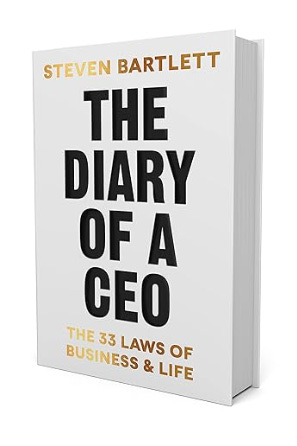#39 | 3.1.24 - Review: The Diary of a CEO // 6 Questions for career midpoints / Salary negotiation resource / Questions for your new hires
Hello, friends, and welcome to Further Faster Fridays! Happy to have you here!
It has been a minute since I’ve written an issue (4 weeks, actually). There has been a lot going on in life and as much as I wanted to put out some content, in the words of Doc Holiday, I had to know to ‘Say When’. 😂
That being said, I’m back in the saddle and excited to bring you some great content for the week.
As a reminder, if this is your first issue, welcome! We ship the best content in personal development and leadership each Friday to help you go further, faster. Glad to have you as part of the community!
Now, on to the content!
Book Review: The Diary of a CEO
I’ve been wanting to read this book for a while so I’m glad that it’s my first finished book of 2024. I learned about the book from the author’s (Steven Bartlett) podcast of the same name.
I enjoyed the book! The premise is 33 ‘laws’ regarding running a company, building a team, as well as general life advice. There’s a lot of wisdom in the book, especially considering the author is under 30 years old.
Here are a few highlights of things I particularly enjoyed:
Intro
One can have no smaller or greater mastery than mastery of oneself – Leonardo DaVinci
You cannot pour from empty buckets
Law 3 – You must never disagree
Healthy conflict strengthens relationship because those involved are working against a problem; unhealthy conflict weakens a relationship because those involved are working against each other
If you want to keep someone’s brain lit up and receptive to your point of view, you must not start your response with a statement of disagreement
As we learn from the widely discussed phenomenon called ‘confirmation bias’, where humans tend to search, favor and recall information in a way that confirms or supports their existing beliefs or values – the further the new evidence is from their current beliefs, the less likely it is to change their thinking.
Law 5 – You must lean into bizarre behavior
I’m uneasy about this most trendy and oversold community. Visionaries see a future of telecommuting workers, interactive libraries and multimedia classrooms. They speak of electronic town meetings and virtual communities. Commerce and business will shift from office and malls to networks and modems. Baloney. The truth is no online database will replace your daily newspaper. – Clifford Stoll, Newsweek, Feb 1995.
Law 6 – Ask, Don’t Tell
Questions, unlike statements, elicit an active response – they make people think.
This means, for instance, that a sign that says “Please Recycle” is much less likely to increase it’s viewers’ chance of recycling than a sign that says “Will you recycle”
Law 13 – Shoot your psychological moonshots first
People don’t want faster delivery. They want less uncertainty about their delivery.
The area of our brain that tries to anticipate consequences is most fire up when we’re faced with uncertainty. It’s on edge.
Do not wage a war on reality, invest in shaping perceptions.
Our truth is not what we see. Our truth is the story we choose to believe.
Law 18 – Fight for the first 5 seconds
When you’re thinking about storytelling, cater to your most uninterested person first.
Law 21 – You must out-fail the competition.
Failure -> Feedback -> Knowledge -> Power. Failure gives you power.
LOVE THIS!!
Law 25 – The Power of Negative Manifestation
The pivotal question you need to ask yourself before any big idea, project or initiative is executed: Why will this idea fail?
Law 30 – 3 Bars for building great teams
Sir Alex Ferguson is widely considered to be the greatest football manager of all time. During his 26 years at the head of Manchester United he won 38 trophies, and in the summer of 2013, after winning the Premier League one last time, he announced he was retiring at the age of 71. When he first joined the struggling side in 1986, he said “The most important thing at Manchester United is the culture of the club. The culture of the club comes from the manager.
The hardest thing I had to learn was to fire people. You must do it to protect the integrity of the company and the culture of the team – Richard Branson
“I couldn’t wait to fire individuals who were negative and didn’t fit. They were ruining my good kids. People who are negative always need somebody to be negative with them. You’ve got to get rid of them. I never carried a negative person that didn’t fit the culture for more than a couple of months. These people are thieves in the night, they take your energy away and your most valuable asset is your energy” – Barbara Corcoran
If everyone in the organization had the same cultural values, attitude, and level of talent as this employee, would the bar (the average) be raised, maintained, or lowered?
Law 31 – Leverage the power of progress
In one company we have an internal workplace channel called “Impact”, which is dedicated to sharing powerful stories, testimonials, and feedback about how each team member’s efforts have impacted the lives of real people, all over the world.
6 Questions to Ask at the Midpoint of Your Career
Gosh, I enjoyed this article so much. This list goes well beyond the questions you would normally find on this list. Not only are there questions, but a few practical exercises to help flush out the answers. Great stuff.
Salary Negotiation resource
Is it just me, or is LinkedIn being overrun by ‘cheat sheets’ these days? It feels like the only content I see is a cheat sheet for this or that. Rant over, because I think this cheat sheet could be useful if you’re in the market for a new position.
Questions for your new hires at 30, 60 and 90 days
This list will be going into the resources I recommend at work. Great questions here.
Words to wrap up
"There is nothing noble in being superior to your fellow men. True nobility lies in being superior to your former self." - Ernest Hemingway







